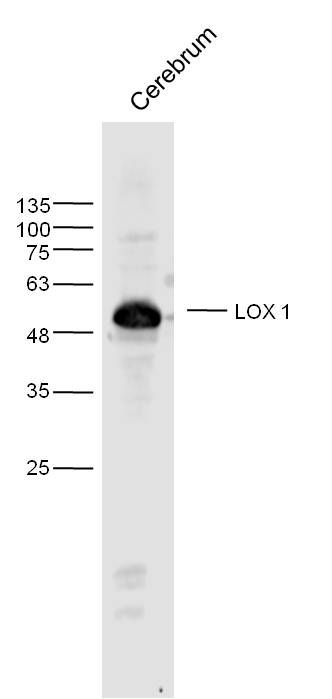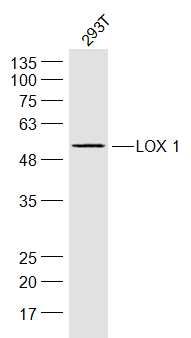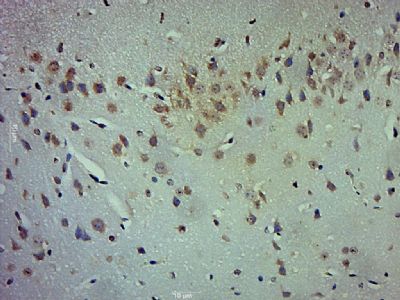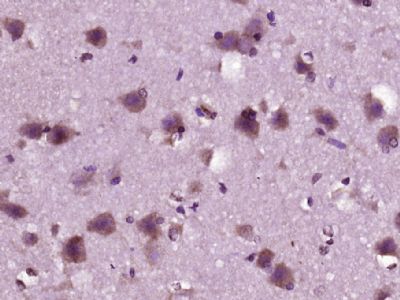Product Name :
OLR1 polyclonal antibody Background :
This gene encodes a low density lipoprotein receptor that belongs to the C-type lectin superfamily. This gene is regulated through the cyclic AMP signaling pathway. The encoded protein binds, internalizes and degrades oxidized low-density lipoprotein. This protein may be involved in the regulation of Fas-induced apoptosis. This protein may play a role as a scavenger receptor. Mutations of this gene have been associated with atherosclerosis, risk of myocardial infarction, and may modify the risk of Alzheimer's disease. Alternate splicing results in multiple transcript variants. Product :
0.01M TBS(pH7.4) with 1% BSA, 0.03% Proclin300 and 50% Glycerol. Storage&Stability :
Store at 4°C short term. Aliquot and store at -20°C long term. Avoid freeze-thaw cycles. Specificity :
OLR1 polyclonal antibody detects endogenous levels of OLR1 protein. Immunogen :
KLH conjugated synthetic peptide derived from rabbit LOX-1:201-273/273
Conjugate :
Unconjugated Modification :
Unmodification
OLR1 polyclonal antibody Background :
This gene encodes a low density lipoprotein receptor that belongs to the C-type lectin superfamily. This gene is regulated through the cyclic AMP signaling pathway. The encoded protein binds, internalizes and degrades oxidized low-density lipoprotein. This protein may be involved in the regulation of Fas-induced apoptosis. This protein may play a role as a scavenger receptor. Mutations of this gene have been associated with atherosclerosis, risk of myocardial infarction, and may modify the risk of Alzheimer's disease. Alternate splicing results in multiple transcript variants. Product :
0.01M TBS(pH7.4) with 1% BSA, 0.03% Proclin300 and 50% Glycerol. Storage&Stability :
Store at 4°C short term. Aliquot and store at -20°C long term. Avoid freeze-thaw cycles. Specificity :
OLR1 polyclonal antibody detects endogenous levels of OLR1 protein. Immunogen :
KLH conjugated synthetic peptide derived from rabbit LOX-1:201-273/273
Unconjugated Modification :
Unmodification
-
 Sample: Cerebrum (Rat) Lysate at 40 ug Primary: Anti- LOX1 at 1/300 dilution
Sample: Cerebrum (Rat) Lysate at 40 ug Primary: Anti- LOX1 at 1/300 dilution -
 Sample:293T(Human) Cell Lysate at 30 ug Primary: Anti-LOX 1 at 1/300 dilution
Sample:293T(Human) Cell Lysate at 30 ug Primary: Anti-LOX 1 at 1/300 dilution -
 Sample:293T(Human) Cell Lysate at 30 ug Primary: Anti-LOX 1 at 1/300 dilution
Sample:293T(Human) Cell Lysate at 30 ug Primary: Anti-LOX 1 at 1/300 dilution -
 Sample:293T(Human) Cell Lysate at 30 ug Primary: Anti-LOX 1 at 1/300 dilution
Sample:293T(Human) Cell Lysate at 30 ug Primary: Anti-LOX 1 at 1/300 dilution
Bioworld Biotech only provide peptides for our antibodies and do not provide additional peptide customization services.
Price/Size :
USD 368/1mg/vial
Tips:
For phospho antibody, we provide phospho peptide(0.5mg) and non-phospho peptide(0.5mg).Describe :
Blocking peptides are peptides that bind specifically to the target antibody and block antibody binding. These peptide usually contains the epitope recognized by the antibody. Antibodies bound to the blocking peptide no longer bind to the epitope on the target protein. This mechanism is useful when non-specific binding is an issue, for example, in Western blotting (WB) and Immunohistochemistry (IHC). By comparing the staining from the blocked antibody versus the antibody alone, one can see which staining is specific; Specific binding will be absent from the western blot or IHC performed with the neutralized antibody.Formula:
Synthetic peptide was lyophilized with 100% acetonitrile and is supplied as a powder. Reconstitute with 0.1 ml DI water for a final concentration of 10 mg/ml.The purity is >90%,tested by HPLC and MS.
Storage:
The freeze-dried powder is more stable. For short time at 2-8°C. For long term storage store at -20°C.
Note :
This product is for research use only (RUO only). Not for use in diagnostic or therapeutic procedures.
 OLR1 polyclonal antibody
OLR1 polyclonal antibody  Datasheet
Datasheet COA
COA MSDS
MSDS SHIP
SHIP